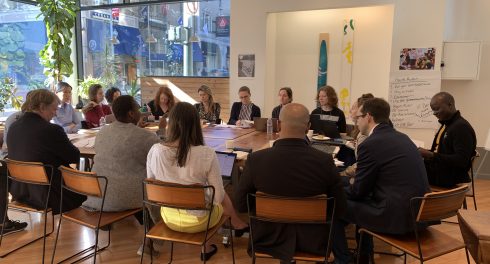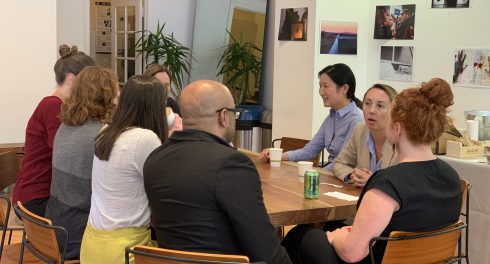Highlights:
- Tax geographies
- Digging on the Belt Road
- A growing fight
- Governance = risk averse?
- A decade of aid transparency: Anything to report?
- TAI Spotlight: From Machine Learning to Transparent Constitutions
In case you missed it…
Tax geographies
 Photo: Pixabay.com
Photo: Pixabay.com
How much does where you live impact your benefit from tax policy? The latest edition of Oxfam’s global index might offer some insights. No surprise that Nordics feature among those doing most to tackle the gap between rich and poor through a combination of policies, but Singapore almost at the bottom of the heap? Read more analysis and then watch this discussion of the importance of a fair and transparent tax system from the IMF/World Bank Annual Meetings in Bali. Attendees there might have been more shocked by the minor earthquake than by ActionAid’s charge that the Fund has not done enough to differentiate impacts of its tax policy advice on men and women, particularly women living in poverty.
The Dutch are angry at cuts to a tax that only foreigners paid, while for those with the resources to move, mercenary tax motivations appear to be highly motivating. Hence many are heading to the United Arab Emirates where it is easy to equate to tax residency and avoid risking their info passing to other tax jurisdictions. On that thread, read up on the dark world of EU Golden Visas which have heightened the flow of illegal money and corruption risks. The EU promises to act – stay tuned for a report by year end with guidance for EU members on instituting appropriate checks.
Not that money laundering risks are confined to Europe – the Basel Institute on Governance highlight wide-ranging vulnerabilities not least due to negligent enforcement of laws on the books. Expect more discussion at next week’s International Anti-Corruption Conference in Copenhagen. In the meantime, check out this new website of anti-corruption resources for policymakers and advocates alike. Not that we needed one, but on top of the Khashoggi disappearance this past week, the murder of Viktoria Marinova, who was writing of alleged fraud involving EU funds, is a scary reminder of the risks anti-corruption investigators face.
Digging on the Belt Road
Worries grow that Chinese firms may bring investment into Asia and beyond but also risk reinforcing corruption networks as well as environmental issues, as one Sri Lanka example suggests. What role for development banks in such deals? We have more potential insight thanks to enhancements in the Asian Infrastructure Investment Bank’s Policy on Public Information (PPI) in support of disclosure.
Mining is one big Chinese investment target, but what about safeguarding local livelihoods? Human Rights Watch suggest few benefits for locals from Bauxite mining in Guinea (Check out the video, too.) Guinea has long been an EITI member, and now Uganda joins the club, but will it add much to an existing law on revenue transparency? Without waiting for any EITI report, Acomai Isabella has been digging into existing government and corporate data to flag potential uncollected royalties and fees.
Essential Viewing
The Profiteers documentary by Africa Uncensored and the Sentry exposes top South Sudan government officials who are looting their country dry to invest in Kenya, Uganda, and Ethiopia. Watch the documentary and read the Sentry’s alert here.
A growing fight
We are likely to see growing tensions between the right to information legislation and efforts to legislate for digital security and data privacy. For RTI advocates, Alena Stern provides welcome evidence that an open data policy can significantly reduce the number of public record requests that cities receive compared to cities that lack an open data policy. Add also Kathrin Frauscher and Coby Jones’ article that advocates for the integration of open contracting into city’s change processes to save money and time, deliver better goods and services, flag political linkages and corruption risks. On the flip side, how to react to legislation such as Bangladesh’s new Digital Security Act that some argue is highly restrictive.
Not that governments always bother to seek the cover of digital security for clamp down. Pakistan that has shut down 18 international aid NGOs for pursuing an “anti-state agenda.” The CIVICUS Monitor has downgraded Nicaragua’s civic space rating from obstructed to repressed because of continuous harassment against human rights defenders and social leaders. Indonesian police canceled a civil society conference around the IMF/WB Annual Meetings. Check out more civic space violations here.
Feeling lost? Ed Rekosh and Lamin Khadar offer a guide to taking action in support of civil society.
Governance = risk averse?
Kim Ogden, Sridhar Prasad, and Roger Thompson have detailed donors big bets on SDG themes, but why so few on Goal 16 (and even fewer on governance aspects)? Not sexy enough? Elements built into other goals, i.e. governance for health outcomes? Lack of clear solutions? One honorable exception being the $100m On Nigeria bet of TAI-member MacArthur Foundation.

Perhaps better feedback from grantees can inspire new ambition. For those on an anti-philanthropy charge, Susan Fitzpatrick suggests many attacks are missing the main point and posing a larger risk to the beneficiaries. Pair reading that with David Callahan’s article on how now conservative philanthropy is thriving while institutional philanthropy is facing a dry spell.
Of course, funders always demand data on impact from grantees, but how to get it? Mary Kay Gugerty and Dean Karlan urge all to ask whether the evidence is credible, actionable, responsible, and transportable. Want to share grantees data responsibly and improve on your data management practices? Get started with this conversation guide from Ariadne. Care about encouraging grantees to leverage data more effectively in their work? Don’t miss TAI’s new report and guiding questions.

A decade of aid transparency: anything to report?
Where are we at on aid transparency? Gary Forster, head of Publish What You Fund applauds the shift to publishing timely data, but still wants it to be more comprehensive, including, financial and performance-related data. Ugandan civil society offers a timely reminder of how such data can be useful, while Rwanda has been nominated as the pilot country for an online system, to help donors and recipients share data on aid management.
Long read of the week

TAI spotlight
From Machine Learning to Transparent Constitutions
Machine learning for better governance
Temina Madona and Michael Jarvis(TAI) observe that for machine learning to better governance in developing countries, there is need to engage civil society, help data scientists self-govern, and support testing and shared learning.
Data against corruption
Lauren Keevill (TAI) explores how Nigeria is using data to fight corruption and support accountability. Download our report on the same here.

Strengthen Work to Promote Open Society Values | Open Society Foundation
President, Patrick Gaspard appoints Tom Perriello as the new executive director of the Foundations’ U.S. Programs. To deepen their commitment to defending and advancing core democratic values in the United States.
Social transformation through the Kenyan Constitution | Omidyar Network
Omidyar Network promises to support Katiba Institute’s work on constitutionalism, transparency, and institution building with a grant of $900,000.
Calls: Proposals, papers, speakers and course invites
- Money Trail Grants – July 15, September 30, November 15
- Accountability Incubator Lab Program – October 21
- Principles for Commercial Confidentiality in Open Contracting – October 26
- Fellowships for Investigative Journalism Conference – October 29 – 31
- Diversity, Equity & Inclusion and Communications for Good – November, 2
- The Finance Innovation Lab Fellowship – November, 5
On the calendar
- Accountable Now webinar series – September 1 – November 30
- Ethical tech Summit – October 20 (Manhattan, New York)
- Global Initiative for Fiscal Transparency webinar series – October 24 – January 27, 2019
- Civic Tech: India 2018 – August- November (Bangalore, Delhi or Mumbai, India)
- 18th International Anti-Corruption Conference – October 22-24 (Copenhagen, Denmark)
- UN World Data Forum – October 22-24 (Dubai, UAE)
- BigSurv18 – October 25-27 (Barcelona, Spain)
- 2018 International Civic Forum at the 18th IACC – October 22-24 (Copenhagen, Denmark)
- Public Sector Economics 2018 Conference – Fiscal Openness: Transparency, Participation, and Accountability in Fiscal Policies – October 26 (Zagreb, Croatia)
- AEA Evaluation 2018: Speaking Truth to Power – October 29 – November 3 (Cleveland, OH USA)
- Global Partnership Forum – October 30 – November 1 (Washington, DC)
- Beneficial Ownership Transparency Conference – October 31 – November 2 (Dakar, Senegal)
- OGP Asia-Pacific Regional Meeting – November 5-6 (Seoul, Korea)
- Canadian Open Data Summit – November 7-9 (Ontario, Canada)
- National Tax Conference – November 12-13 (Washington, DC)
- Data4Good Conference – November 14 (Birmingham, UK)
- ODI Summit – Data|Value – November 20 (London, UK)
- Outcome-Oriented Monitoring, Evaluation & Learning – December 3-5 (Nairobi, Kenya)
- Open Data Day – March 2, 2019
- TICTec Research Conference – March 19-20 (Paris, France)
- The CEP Conference – May 7-9 (Minneapolis, USA)
- Csv, conf, v4 – May 8-9, Eliot Centre, Portland
- Collective Impact Forum Convening – May 14-16, 2019 (Chicago, USA)
- 2019 Open Government Partnership Global Summit – May 29-31, 2019 (Ottawa, Canada)
- RightsCon Tunis – June 11-14, 2019 (Tunis, Tunisia)
- Global Conference on Transparency Research – June 26 – 27, 2019 (Rio de Janeiro, Brazil)


